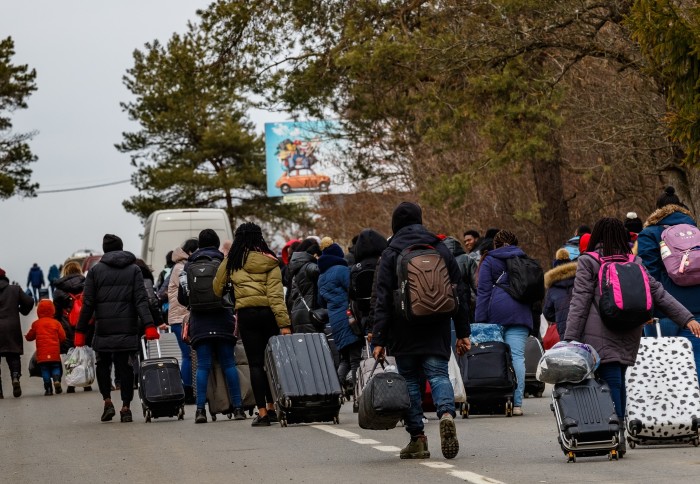Guide to help displaced Ukrainians created with Imperial College Business School

Credit: Shutterstock / Yanosh Nemesh
Imperial College Business School has helped develop a guide to support community leaders in France look after displaced people from Ukraine.
A team of students, faculty and staff from Imperial College Business School have been working with the French charity Solidarité Ukraine to create a playbook so that other communities can replicate what a community in Saint-Omer, northern France, has achieved since early March in resettling Ukrainians currently displaced by the war.
I am so proud of Imperial's contribution in this crisis Mary Meaney
The charity is led by Imperial College Business School Advisory Board and Imperial Council member Mary Meaney who has been at the forefront of efforts to support displaced Ukrainians in Saint-Omer, around 40 miles from Lille.
Mary has worked with the Imperial team to create the guide and lead a local effort that includes hundreds of volunteers, while also providing shelter for scores of displaced Ukrainian people at her home in France, including 11 orphaned children.

The toolkit – entitled Solidarity Ukraine: A Guide to Welcoming Ukrainian Displaced People – provides sound and practical advice on how community leaders can best manage the arrival and resettlement of Ukrainian people.
Holistic support
Imperial College London President Professor Alice Gast said: “As part of our response to the crisis in Ukraine, students and staff at the Business School have worked hard and quickly with Solidarité Ukraine to put together this commendable guide.

“It is a great piece of work and sets out the best approach for a community to take to coordinate integrated, holistic support for Ukrainian displaced people, and also contains key documents in French and Ukrainian.”
Celia Moore, Professor of Organisational Behaviour at Imperial College Business School, worked on the guide with Mary Meaney, along with a team of Imperial students including Marina Moncayola Lobato, Sneha Kuruvilla, Karina Penska and Karolina Kaczmarek.
She said: “Mary’s leadership and dedication throughout this crisis has been inspiring, and I applaud her for spearheading the creation of this important guide. I worked alongside three incredible Ukrainian students from the Business School to codify and organise what the group in Saint-Omer has learned about how to come together to support, feed, clothe, house, employ, educate, and provide health care for the influx of Ukranians fleeing the country. My role was secondary to Mary and the students’ star performances, and deserve absolute kudos for their tireless efforts.”
Mary Meaney said: “As leader of the Solidarité Ukraine initiative, I am deeply grateful to Celia, Marina and the entire team from Imperial for their incredible work.
“So far, our community in northern France has welcomed over 250 Ukrainian women and children, and this guide will be invaluable as we scale up our support to other Ukrainians in other communities across France. As a member of Imperial College Council and also Imperial College Business School's Advisory Board, I am so proud of Imperial's contribution in this crisis.”
![Business School students [names TBC] with the guide](/newsarchive/images/mainnews2012/img-3605-copy_1650614390662_x2.jpg?r=7135)
About the guide
The guide offers a range of training materials for those interested in mobilising their communities to support Ukrainian women and children.
Key areas covered include the organisation of transport of displaced Ukrainian people and preparing the French host families for their arrival.
It also contains details of how to match and host Ukrainian families and support people who are suffering from trauma, and looks at the practicalities of making sure refugees are provided with essentials, such as clean clothing, toothbrushes, shampoo, clothes, baby equipment, diapers as well as access to computers to connect with their families and friends.
Since the beginning of March, Solidarité Ukraine has worked with the community of Saint-Omer to welcome hundreds of Ukrainian women and children, and has found solutions to house, feed, clothe and care for them all.
All the Ukrainian primary and secondary school children who arrived in March are now in French schools and teenagers and adults are attending French classes offered in person four days a week, with additional online classes.
Upon arrival, every Ukrainian has had a comprehensive medical check-up, including status check on vaccinations, chronic conditions and psychological state, and has had access to medical care. The team in Saint-Omer also has 60 Russian and Ukrainian-speaking psychologists providing mental health support.
Other efforts included the submission of all French documents for Ukrainian families to receive their protected status and a new “bus stop” in front of the Ukrainian welcome centre with free transport for all Ukrainians.
The community has also organised an array of activities including French language, art classes and sports competitions.
Imperial worked with Solidarité Ukraine to create the guide to capture the learnings of the experiences of the community in Saint-Omer in managing the refugee crisis so far.
The plan is for the guide to be used by other communities who are seeking to replicate the model used in Saint-Omer. A version of the guide for use in the UK is also being planned.
The news follows the launch of new funds to support refugees and asylum seekers at Imperial. Mary Meaney, along with other members of Imperial’s governing Council and senior staff, were among the first to pledge their support, which currently stands at close to £250,000 of donations and Imperial funding.
Article text (excluding photos or graphics) © Imperial College London.
Photos and graphics subject to third party copyright used with permission or © Imperial College London.
Reporter
Laura Singleton
Communications Division